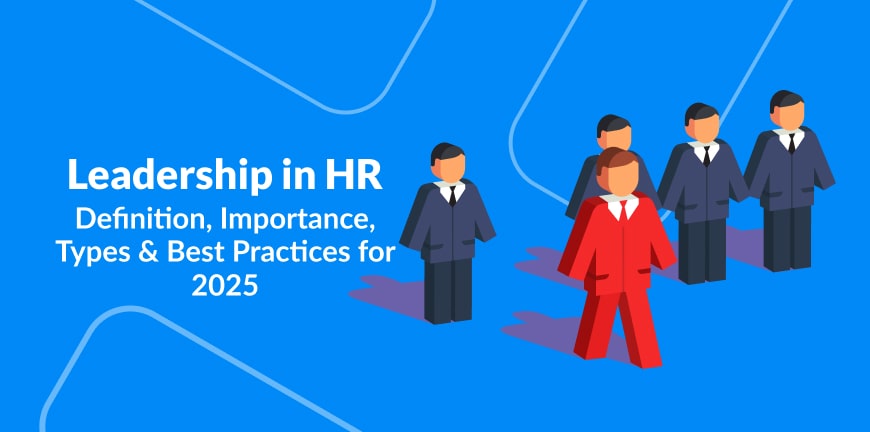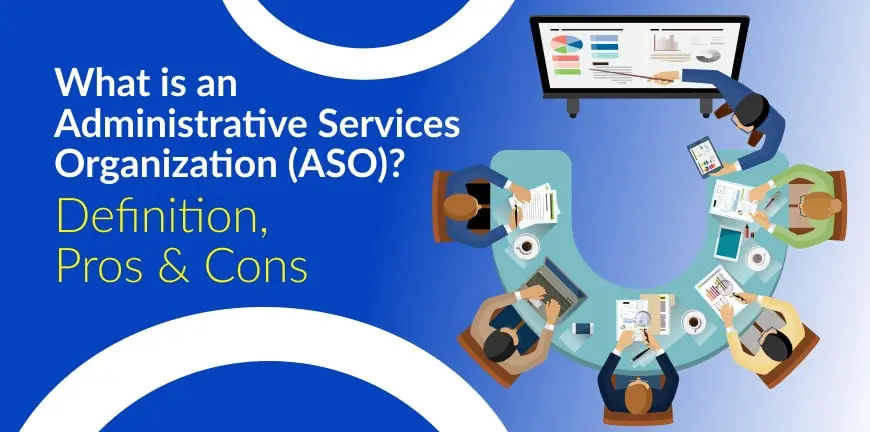
What is Zoho Payroll? Meaning, Features, Benefits
26/07/2025
How HR Leaders Can Stay Ahead in the Gig Economy Era?
29/07/2025- What Is Leadership in HR?
- Why Is Leadership Important in HR?
- What Are the Essential Leadership Skills in HR?
- What Are the Types of Leadership in HR?
- How Does Leadership Style Impact HR Management?
- What Are the Best Leadership Practices in HR?
- What Are Examples of Effective Leadership in HR?
- Key Takeaways
- Frequently Asked Questions (FAQs)
“If you give people freedom, they will amaze you. Great HR leadership is about creating systems that unleash that freedom.”- Laszlo Bock, Former SVP of People Operations at Google.
Leadership is the cornerstone for every company to stay ahead and make consistent progress towards reaching the zenith of the business world. Also, strong leadership helps companies to overcome adversities and get back on track towards success.
Leadership in HR also plays a similar role in helping companies manage the workforce and get the best out of them consistently. According to PwC Workforce Survey, 54% of HR professionals believe their leadership team lacks diversity, which directly affects talent attraction and innovation. This shows HR leadership skills can be a game-changer for companies to achieve their vision & build their brand value.
Let’s dig deep and understand HR leadership definition, importance, types, & best practices to get a clear idea of why leadership in HR can make or break a company’s future.
What Is Leadership in HR?
Leadership in HR is a multi-dimensional role that not only serves as a guiding torch for employees towards achieving organisational goals through effective people management but also acts as a strategic partner & mentor who creates positive impact through effective HR strategies.
The strategic HR leadership necessitates vision, empathy, quick thinking, strong decision making, and deep understanding of human dynamics and organisational objectives to build a work culture that converts aspirations into realities. The essential HR leadership qualities that make them stand out include:
- A strong HR leader must lead with empathy, not by rules.
- They believe a positive work culture can bring a competitive edge.
- They leverage data for strategic decision-making.
- They promote continuous learning and development.
- They develop agile, loyal, and future-ready workforces.
- They build leaders across all levels.
- They use technology to create the best employee experience.
- They bring and retain the right talent that takes the company to new heights.
- They ensure brand reputation is maintained under all circumstances.
Why Is Leadership Important in HR?
Leadership in HR is a secret ingredient that shapes company culture & modus operandi, attracts & retains talent for the long haul, drives employee engagement, & aligns HR practices with organisational goals. According to HR leadership definition, ” A HR leader is a bridge between upper management and employees, creating a camaraderie that helps in achieving organisational goals and enhances brand value.”
Here are the reasons that make leadership development at HR imperative for organisational success:
1. Strategic Alignment
A strategic HR leadership will help in perfectly aligning human resource management strategies with organisational goals, leading to higher productivity and sustained business growth for a long time.
2. Talent Management
Leadership qualities in HR play a protagonist role in talent management through effective recruitment, development, and retention strategies. HR leaders must be involved in workforce & succession planning to ensure a leadership talent pool is created within the organisation, securing the organisation’s future.
3. Compliance and Risk Management
HR and leadership play a pivotal role in compliance and risk management across departments and functions. Any leadership and strategic HR issue can lead to violations that can disrupt operations and create bad terms with government authorities.
HR leadership team must ensure company policies, procedures, & employee engagement align with regulations and laws, resulting in reduced legal risks, promoting ethical practices, boosting employee morale, and improving brand value.
4. Conflict Resolution
Addressing and resolving employee and management conflicts is one of the most important hr functions under leadership umbrella. HR leaders must help management create a harmonious working environment that helps employees execute their skills with maximum efficiency and feel valued.
5. Change Management
A balance of HR strategy cost leadership is paramount for helping companies make transitions such as mergers & acquisitions, deploy new policies or systems, restructuring, new leadership group selection, or any other changes with relative ease. These HR leadership skills can play the role of catalysts in boosting brand value & profitability.
6. Compensation and Benefits
As part of strategic HR leadership, lucrative salary & benefit packages must be churned out to help employees manage their personal and professional lives seamlessly and motivate them to stay associated with the company for an extended period. A long-term association with talented employees will bring continued success and make the company stand out in the business world.
7. Employee Training and Development
HR leadership goals must include creating effective employee training and development programs that help in improving technical & managerial skills, accelerate career growth, tackle complex situations with diligence, and create the drive for long-term success.
What Are the Essential Leadership Skills in HR?
Leadership in HR combines skills, competency, & an innate ability to develop sound HR strategies that create a win-win situation for both management and employees in the workplace. The key HR leadership skills that every existing and prospective HR leader must develop include:
1. Business Acumen
One of the important leadership qualities in HR is to have business acumen that helps create HR strategies that align with organisational goals rather than the other way round. Every HR leader must have in-depth business knowledge in terms of products developed, services offered, current business trends, compliance requirements, etc, to thrive and create a competent workforce that delivers from 360 perspective.
2. Strategic Thinking
Strategic HR leadership is vital for helping companies build their business success plan, keeping workforce as the nucleus. HR leaders must develop workforce planning & other HR strategies that cater to both short & long-term business goals, current market trends, & future hiring demands.
3. Communication Skills
One of the most non-negotiable HR leadership skills that every HR leader must have or develop is effective communication. HR leaders must be able to convey their ideas, opinions, speech, & written communication in a clear and empathetic manner with employees, stakeholders, leadership group, and clients.
4. Emotional Intelligence
One of the most important skills that successful leadership in HR demands is emotional intelligence. As a workplace involves employees with different minds, backgrounds, regions, expertise, etc., arguments and miscommunication instances do happen from time to time.
HR leaders must develop the skills to tackle these conflicts with diligence and create a positive culture where employees get equal opportunities to grow and maintain cordial relationships with fellow teammates.
What Are the Types of Leadership in HR?
There are several types of leadership in HR based on skills, approach, decision-making ability, organisation’s culture, and style of leadership. Here are some hr leadership styles prevalent in most companies:
1. Transformational Leadership
Here, the HR leader motivates and inspires employees, transforming them to deliver best outcomes, creating a win-win for both companies and employees.
2. Visionary Leadership
It is one of the most effective HR leaderships styles that helps companies accelerate their growth. The HR leaders who fit this bill tend to create a long-term vision & make sure every employee regardless of designation strives to achieve it wholeheartedly.
3. Democratic Leadership
HR leaders who work with a democratic leadership mindset involve employees and management to make every organisational decision. They value input from cross-functional teams, promote open communication, & create inclusive policies that reflect collective insights, resulting in better workforce alignment.
4. Strategic Leadership
These types of HR professionals in the leadership arena have an uncanny knack of churning out innovative HR strategies that can accelerate a company’s growth & drive employee retention. Strategic HR leadership involves stage-wise synchronising of HR practices with business goals, & leaders who have mastered the art of strategic leverage will evolve with trends and make subtle modifications & add nuances to the existing strategies to drive exponential growth and employee engagement.
How Does Leadership Style Impact HR Management?
HR leadership styles play a decisive part in carving out sound HR management strategies, influencing decision-making, driving employee engagement, deploying compliant policies, & enhancing overall company culture, ultimately driving talent retention, growth, & long-term business success. Here are 5 ways in which HR leadership styles impact HR management.
1. Influences Recruitment and Talent Strategy
HR Leaders who have a vision to transform workforce help HR teams build innovative hiring approaches in a short time, attracting top talent. HR leadership skills & guidance shape inclusive recruitment policies, ensuring HR aligns hiring processes with evolving organisational needs & goals.
2. Shapes Organisational Culture
HR leadership qualities and style directly affect workplace culture. Democratic HR leaders create cohesive work environments, promoting camaraderie & transparency, which motivates employees & drives long‑term cultural harmony & productivity.
3. Impacts Employee Engagement Levels
Leadership in HR emphasises communication & empathy to be the bedrock of management, facilitating better employee engagement. By valuing employee input and initiatives, HR leaders develop policies that increase morale, reduce turnover, & inspire employees to perform consistently well.
4. Determines Conflict Resolution Approaches
HR leadership styles dictate how the HR team handles disputes. HR leaders with situational leadership style adapt strategies to each case, balancing assertiveness with support, ensuring fair outcomes while maintaining healthy relationships within the workforce.
5. Drives Training and Development Priorities
HR leaders have a strong inclination towards prioritising upskilling initiatives. Their mentorship approach leads to robust learning programs, enhancing employee competencies, improving retention, & aligning workforce development with strategic organisational objectives.
What Are the Best Leadership Practices in HR?
Here are 5 best leadership HR practices that can help get better outcomes in terms of
HR management and overall business growth:
1. Foster Transparent Communication
Leadership in HR must enable open communication channels with teams & management that are accommodating and transparent. This ensures there is clarity in policies, expectations, & feedback, which builds trust, reduces instances of miscommunication, & strengthens organisational alignment.
2. Promote Inclusive Decision‑Making
Encouraging prompt employee participation in policy discussions & process improvements is one of the most important leadership qualities in HR. It allows HR leaders to leverage diverse perspectives, leading to fairer decisions, better engagement, & a culture that values every individual’s contribution.
3. Lead by Ethical Example
Leadership in HR must demonstrate integrity, fairness, and respect in all actions. Modelling ethical behaviour sets standards for employees, drives compliance, and fosters a work environment built on accountability & trust.
4. Invest in Continuous Learning
One of the key HR leadership qualities that makes them stand out is the hunger to consistently upskill themselves and their teams, staying updated on trends, laws, and best practices. This ensures proactive decision‑making, innovative strategies, and a future‑ready workforce.
5. Build Strong Employee Relationships
HR leaders must prioritise genuine engagement with employees, understanding their needs and challenges rather than communicating like going through the motions. This approach enhances loyalty, reduces attrition, & ensures HR policies resonate with the workforce’s real‑world experiences.
What Are Examples of Effective Leadership in HR?
Here are a few examples that demonstrate effective leadership in HR:
1. Deploying Transparent Feedback Systems
Leadership in HR helps introduce regular 360‑degree feedback sessions, fostering openness, improving employee growth, & strengthening organisational trust & communication.
2. Driving DEI Initiatives
A strategic HR leadership move that demonstrates effective leadership is creating diversity & inclusion-driven talent acquisition programs. This approach creates equal opportunities for candidates from all walks of life, celebrating differences, & creating a work premise where everyone feels valued and respected.
3. Leading Change Management Projects
An HR strategy cost leadership team guides workforce via organisational restructuring, communicating clearly, addressing concerns, & ensuring smooth transitions with minimal disruption or resistance.
4. Establishing Comprehensive HR Training Frameworks
A Human Resource Manager develops structured leadership training HR, empowering employees working in the recruitment process with new skills, boosting productivity, &enhancing organisational capability over time.
5. Resolving Conflicts Proactively
Leadership in HR acts as a third umpire to resolve internal disputes & arguments between employees and cross-functional teams in real-time with an unbiased mindset, listens actively, implements fair solutions, & maintains harmony, ensuring a positive & collaborative workplace culture.
Key Takeaways
- Strong HR leadership aligns workforce strategies with overall organisational goals.
- Effective HR leaders drive culture, engagement, and long-term retention.
- Transformational, visionary, and strategic leadership styles empower HR teams.
- Continuous learning and ethical practices are core to HR leadership.
- Proactive conflict resolution fosters harmony and boosts business productivity.
Frequently Asked Questions (FAQs)
1. What is leadership in HR?
Leadership in HR is guiding, influencing, & empowering employees while shaping policies, culture, and strategies to align workforce efforts with organisational goals.
2. Why is leadership important in human resource management?
Leadership in HR ensures effective talent management, drives engagement, fosters growth, resolves conflicts, and creates a thriving, compliant, and productive workplace environment.
3. What are the main types of leadership styles in HR?
Transformational, strategic, democratic, and visionary are common HR leadership styles, each shaping decision-making, communication, and workforce management approaches.
4. What skills are essential for HR leaders?
The key HR leadership skills include communication, empathy, strategic thinking, conflict resolution, decision-making, adaptability, coaching, ethical judgment, and strong analytical abilities to guide workforce initiatives effectively.
5. How can HR leadership improve employee retention?
Strategic HR leadership can enhance retention by fostering trust, creating development pathways, offering recognition, ensuring fairness, and aligning policies with employee needs.
6. What Are the Essential HR Leadership Qualities Every Leader Should Have?
Vision, integrity, resilience, emotional intelligence, decisiveness, and collaboration are vital leadership qualities in HR to inspire teams and achieve goals.
7. What Are the Core HR Functions That Fall Under Leadership?
Recruitment, performance management, learning and development, succession planning, employee engagement, and compliance oversight are core HR functions under leadership.
8. How Can HR Leaders Manage Strategic HR Issues?
Leadership and strategic HR issue is managed by aligning policies with business goals, anticipating workforce needs, mitigating risks, and driving proactive change initiatives.
Contact Us For Business Enquiry

Rajkumar Shanmugam
Rajkumar Shanmugam is the Head of HR at ALP Consulting, bringing over 19 years of comprehensive HR leadership experience across India and international markets. His expertise spans talent acquisition, employee relations, performance management, compliance, and HR transformation. Rajkumar has a proven track record of driving people-centric initiatives, enhancing workplace culture, and aligning HR strategy with business goals. With extensive experience in US staffing operations and global mobility, he continues to lead organizational excellence through innovation and employee engagement.




